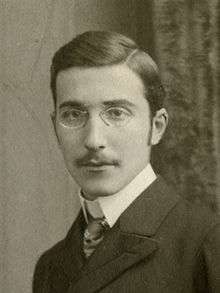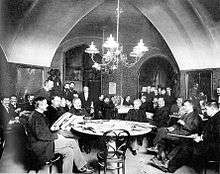The World of Yesterday
The World of Yesterday: Memories of a European (German title Die Welt von Gestern: Erinnerungen eines Europäers) is the memoir[1][2][3] of Austrian writer Stefan Zweig.[4] It is considered the most famous book on the Habsburg Empire.[5] He started writing it in 1934 when, anticipating Anschluss and Nazi persecution, he uprooted himself from Austria to England and later to Brazil. He posted the manuscript, typed by his second wife Lotte Altmann, to the publisher the day before they both committed suicide in February 1942. The book was first published in Stockholm (1942), as Die Welt von Gestern.[6] It was first published in English in April 1943 by Viking Press.[4]
The book describes life in Vienna at the start of the 20th century with detailed anecdotes.[4] It depicts the dying days of Austria-Hungary under Emperor Franz Joseph I of Austria, including the system of education and the sexual ethics prevalent at the time, the same that provided the backdrop to the emergence of psychoanalysis.
According to Zweig, earlier European societies, where religion (i.e. Christianity) had a central role, condemned sexual impulses as work of the devil. The late 19th century had abandoned the devil as an explanation of sexuality; hence it lacked a language able to describe and condemn sexual impulses. Sexuality was left unmentioned and unmentionable, though it continued to exist in a parallel world that could not be described, mostly prostitution. The fashion at the time contributed to this peculiar oppression by denying the female body and constraining it within corsets.

The World of Yesterday details Zweig's career before, during and after World War I. Of particular interest are Zweig's description of various intellectual personalities, including Theodor Herzl, the founder of modern political Zionism, Rainer Maria Rilke, the Belgian poet Emile Verhaeren, the composer Ferruccio Busoni, the philosopher and antifascist Benedetto Croce, Maxim Gorky, Hugo von Hofmannsthal, the German industrialist and politician Walther Rathenau and the pacifist and friend Romain Rolland. Zweig also met Karl Haushofer during a trip to India. The two became friends. Haushofer was the founder of geopolitics and became later an influence on Adolf Hitler. Always aloof from politics, Zweig did not notice the dark potential of Haushofer's thought; he was surprised when later told of links between Hitler and Haushofer.
Zweig particularly admired the poetry of Hugo von Hofmannsthal and expressed this admiration and Hofmannsthal's influence on his generation in the chapter devoted to his school years:
"The appearance of the young Hofmannsthal is and remains notable as one of the greatest miracles of accomplishment early in life; in world literature, except for Keats and Rimbaud, I know no other youthful example of a similar impeccability in the mastering of language, no such breadth of spiritual buoyancy, nothing more permeated with poetic substance even in the most casual lines, than in this magnificent genius, who already in his sixteenth and seventeenth year had inscribed himself in the eternal annals of the German language with unextinguishable verses and prose which today has still not been surpassed. His sudden beginning and simultaneous completion was a phenomenon that hardly occurs more than once in a generation."— Stefan Zweig, Die Welt von Gestern, Frankfurt am Main 1986, 63-64

Notable episodes include the departure from Austria by train of the last Emperor Charles I of Austria in 1918, the beginning of the Salzburg festival and the Austrian hyperinflation of 1921–22. Zweig admitted that as a young man he had not recognized the coming danger of the Nazis, who started organizing and agitating in Austria in the 1920s. Zweig was a committed pacifist but hated politics and shunned political engagement. His autobiography shows some reluctance to analyse Nazism as a political ideology; he tended simply to regard it as the rule of one particularly evil man, Hitler. Zweig was struck that the Berghof, Hitler's mountain residence in Berchtesgaden, was just across the valley from his own house outside Salzburg. Berchtesgaden was an area of early Nazi activity. Zweig believed strongly in Europeanism against nationalism.
Zweig also describes his passion for collecting manuscripts, mostly literary and musical.
Zweig collaborated in the early 1930s with composer Richard Strauss on the opera Die schweigsame Frau, which is based on a libretto by Zweig. Strauss was then admired by the Nazis, who were not happy that the new opera of their favourite composer had a libretto by a Jewish author. Zweig recounts that Strauss refused to withdraw the opera and even insisted that Zweig's authorship of the libretto be credited; the first performance in Dresden was said to have been authorized by Hitler himself. Zweig thought it prudent not to be present. The run was interrupted after the second performance, as the Gestapo had intercepted a private letter from Strauss to Zweig in which the elderly composer invited Zweig to write the libretto for another opera. This led, according to Zweig, to Strauss' resignation as president of the Reichsmusikkammer, the Nazi state institute for music.
Nothing is said of Zweig's first wife; his second marriage is briefly touched upon. The tragic effects of contemporary antisemitism are discussed but Zweig does not analyse in detail his Jewish identity. Zweig's friendship with Sigmund Freud is described towards the end, particularly while both of them lived in London during the last year of Freud's life. The book finishes with the news of the start of World War II.
"When I attempt to find a simple formula for the period in which I grew up, prior to the First World War, I hope that I convey its fullness by calling it the Golden Age of Security."[4]
Notes
- ↑ Jones, Lewis (11 January 2010), "The World of Yesterday", The Telegraph, retrieved 2015-11-02
- ↑ Lezard, Nicholas (4 December 2009), "The World of Yesterday by Stefan Zweig", The Guardian, retrieved 2015-11-02
- ↑ Brody, Richard (14 March 2014), "Stefan Zweig, Wes Anderson, and a Longing for the Past", New Yorker Magazine, retrieved 2015-11-02
- 1 2 3 4 The World of Yesterday, Viking Press.
- ↑ Giorgio Manacorda (2010) Nota bibliografica in Roth La Marcia di Radetzky, Newton Classici quotation:
Stefan Zweig, l'autore del più famoso libro sull'Impero asburgico, Die Welt von Gestern
- ↑ Darién J. Davis, Oliver Marshall (ed.), Stefan and Lotte Zweig's South American Letters: New York, Argentina and Brazil, 1940–42, Continuum International Publishing Group, 2010, p. 41.
External links
- Unger, Nikolaus. Remembering Identity in Die Welt von Gestern. Stefan Zweig, Austrian German Identity Construction and the First World War